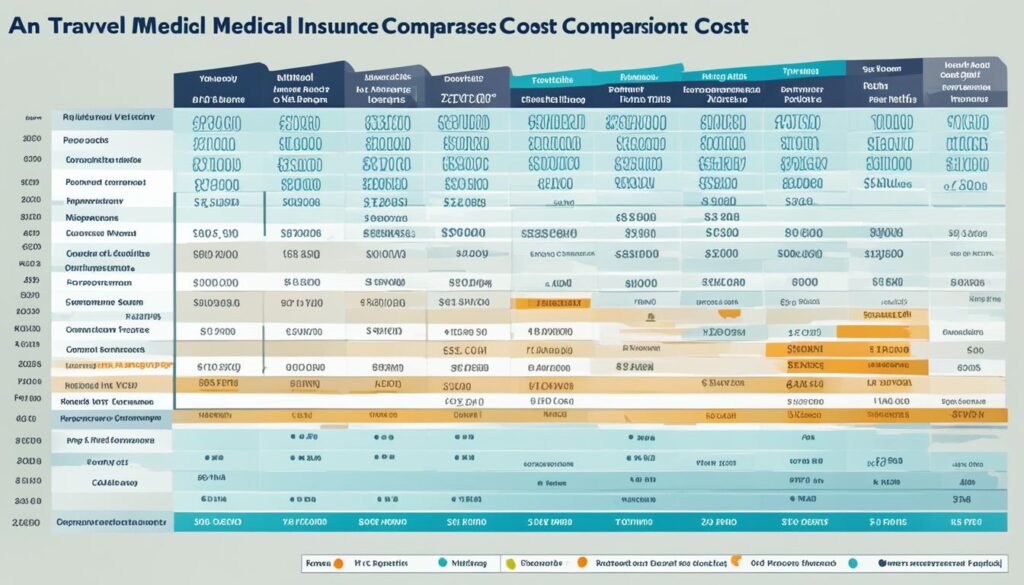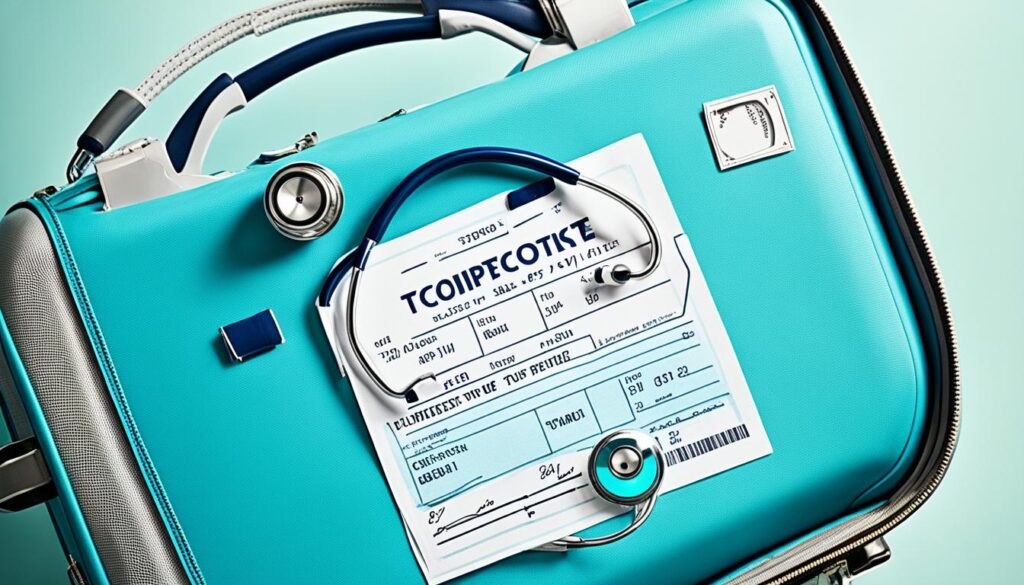Embarking on international adventures can be an exhilarating and enriching experience, but it also comes with the potential for unexpected medical emergencies. Medical health travel insurance is a crucial safeguard that can protect you from the high costs of healthcare and related expenses while traveling abroad. Whether you’re planning a leisurely vacation or an adrenaline-filled expedition, this type of insurance can provide the coverage you need to navigate any medical situations that arise during your journeys.
Without travel medical insurance, the financial burden of emergency medical care or medical evacuation can quickly become overwhelming. Your domestic health insurance may not extend to injuries or illnesses sustained outside your home country, leaving you responsible for potentially thousands of dollars in medical bills. Travel medical insurance can help fill this gap, providing insurance coverage for a wide range of medical services, including hospital stays, doctor visits, and even emergency medical evacuation if necessary.
In addition to medical coverage, many travel insurance plans also offer benefits such as compensation for delayed baggage or nonrefundable trip costs, as well as 24/7 assistance services. This comprehensive approach can give you the peace of mind to fully immerse yourself in your international travels without worrying about the financial implications of unexpected medical emergencies.
Whether you’re a seasoned globetrotter or embarking on your first international trip, investing in medical health travel insurance is a smart decision that can protect both your health and your finances during your journeys. By understanding the coverage options and factors that influence the cost of travel medical insurance, you can find the right plan to suit your needs and budget, ensuring you have the coverage you need to explore the world with confidence.
Key Takeaways
- Medical health travel insurance can cover emergency medical expenses, evacuation, and other unexpected situations during international travel.
- Without travel medical insurance, you could be responsible for thousands of dollars in medical bills if your domestic health insurance doesn’t extend to injuries or illnesses sustained abroad.
- Travel medical insurance can provide secondary coverage if your primary health insurance has a higher deductible or out-of-pocket maximum.
- Medical-only travel insurance policies are more affordable than full travel insurance but have a limited range of benefits.
- Researching the coverage options and factors that influence the cost of travel medical insurance can help you find the right plan for your needs and budget.
What is Medical Health Travel Insurance?
Travel medical insurance, also known as travel health insurance, is designed to cover a range of medical expenses you may incur during your travels, just as your standard health insurance covers emergencies at home. These policies often include emergency medical evacuation coverage, which can pay for the cost of transporting you to a suitable medical facility if you sustain an injury or illness in an area without readily available medical care. Coverage may also extend to benefits for accidental death and dismemberment, as well as repatriation of remains.
Understanding Travel Medical Insurance
While travel medical insurance provides coverage for medical-related expenses, it is important to note that it is distinct from a comprehensive travel insurance plan. A complete travel insurance policy offers additional benefits such as trip cancellation, trip interruption and delay, and lost or delayed baggage. Travelers should carefully review the specifics of their coverage to ensure they have the appropriate protection for their needs.
Travel Medical vs. Travel Insurance
Travel medical insurance and comprehensive travel insurance serve different purposes. Travel medical insurance is focused on covering emergency medical expenses and evacuation, while travel insurance provides a broader range of benefits to protect your overall trip investment. Depending on your travel plans and concerns, you may opt for a standalone travel medical policy or a more comprehensive travel insurance plan that includes medical coverage.
COVID-19 Coverage in Travel Medical Plans
During the COVID-19 pandemic, most reputable travel medical insurance companies have updated their policies to include coverage for medical expenses related to the virus. This can provide valuable protection if you contract COVID-19 while traveling abroad and require medical attention or hospitalization. When selecting a travel medical insurance plan, be sure to review the specific coverage details, including any COVID-19-related benefits.
Benefits of Medical Health Travel Insurance

Travel medical insurance can provide valuable coverage and protection during your international adventures. Let’s explore the key benefits of investing in a comprehensive medical health travel insurance plan.
Emergency Medical Expenses Coverage
One of the primary benefits of medical health travel insurance is the coverage it provides for emergency medical expenses. If you sustain an injury or fall ill while traveling abroad, your travel medical insurance can help cover the cost of hospital stays, doctor visits, and other necessary healthcare expenses. This can be particularly valuable in countries with high medical costs, ensuring you receive the care you need without facing financial hardship.
Emergency Medical Evacuation Coverage
In some cases, the local medical facilities may not be equipped to handle your emergency. That’s where the emergency medical evacuation coverage of your travel medical insurance plan comes into play. This benefit can cover the cost of transporting you to a more advanced medical facility, either within the country or even back to your home country, if necessary. This can provide peace of mind and ensure you have access to the appropriate level of care during a medical crisis.
Accidental Death and Dismemberment Coverage
Tragically, accidents can happen during international travel. Travel medical insurance policies often include accidental death and dismemberment coverage, providing financial protection for you and your loved ones in the event of a fatal or life-altering incident. This coverage can help cover the costs associated with repatriation of remains or provide a lump-sum payment to your beneficiaries, alleviating the financial burden during an already difficult time.
By understanding the comprehensive benefits of medical health travel insurance, you can make an informed decision and choose a plan that best fits your travel needs and provides the coverage you require. Whether you’re traveling for business, leisure, or adventure, the right travel medical insurance can give you the confidence to explore the world with peace of mind.
When Do You Need Medical Health Travel Insurance?

Navigating the world requires careful preparation, and one crucial consideration for international travelers is medical health travel insurance. This specialized coverage can provide a vital safety net for various situations that may arise during your journeys.
Pre-Existing Medical Conditions
Travelers with pre-existing medical conditions may find that their regular health insurance plans do not adequately cover their needs while abroad. Medical health travel insurance can help fill this gap, ensuring that any issues related to your pre-existing condition are addressed without leaving you financially vulnerable.
Adventure and Extreme Sports
The thrill of adventure sports and extreme activities is a major draw for many travelers, but these pursuits also carry inherent risks. Many standard travel insurance policies exclude injuries sustained from high-risk pursuits, making medical health travel insurance a prudent investment for those planning to participate in activities like bungee jumping, skydiving, or mountain climbing during their trip.
International Travel Requirements
Several countries, particularly those in the Schengen Area of Europe, mandate that travelers have sufficient travel insurance, including medical coverage, before granting entry or issuing a visa. Researching the entry requirements for your destination is crucial to determine if medical health travel insurance is necessary for your trip.
| Scenario | Recommended Coverage |
|---|---|
| Pre-Existing Medical Conditions | Comprehensive medical health travel insurance with coverage for any condition-related issues that may arise during your trip. |
| Adventure and Extreme Sports | Travel medical insurance with specific coverage for injuries sustained during high-risk activities, including emergency evacuation and repatriation. |
| International Travel Requirements | Travel medical insurance that meets the minimum coverage levels mandated by the destination country, typically at least $100,000 in medical expense limits. |
By understanding the various scenarios where medical health travel insurance is recommended or required, you can ensure that your international adventures are protected, allowing you to explore the world with greater peace of mind.
Types of Medical Health Travel Insurance Plans

When shopping for travel medical insurance, it’s important to understand the different types of plans available. Let’s explore the key distinctions between primary, secondary, single-trip, and multi-trip travel medical insurance policies.
Primary Travel Medical Insurance
Primary travel medical insurance serves as the primary coverage for your medical expenses during a trip. This means it will be the first policy to pay out claims, providing comprehensive protection for a wide range of medical emergencies and incidents. Primary travel medical insurance is often the best option for those without adequate health insurance coverage in their home country.
Secondary Travel Medical Insurance
Secondary travel medical insurance provides additional coverage to supplement your existing health insurance plan. If your primary health insurance has a high deductible or out-of-pocket maximum, a secondary travel medical policy can help fill those gaps and ensure you’re fully protected during your travels. Secondary plans tend to be more affordable than primary coverage.
Single-Trip vs. Multi-Trip Plans
Travel medical insurance is available in both single-trip and multi-trip policy options. A single-trip plan covers a specific, individual journey, while a multi-trip plan provides coverage for multiple trips within a 12-month period. Multi-trip plans are ideal for frequent travelers, as they offer the convenience of ongoing protection without the need to purchase a new policy for each trip.
By understanding the differences between these travel medical insurance plan types, you can select the coverage that best aligns with your individual travel needs and budget, ensuring you’re prepared for any medical emergencies or unexpected situations that may arise during your journeys.
Factors Affecting Medical Health Travel Insurance Costs

The cost of medical health travel insurance can be influenced by several key factors, including the age of the traveler, the destination of the trip, the duration of the journey, and the coverage limits and deductibles selected.
Age of the Traveler
Older travelers generally face higher premiums for their medical health travel insurance. As individuals age, the risk of medical emergencies or pre-existing conditions increases, leading insurance providers to charge higher rates to offset this potential liability.
Travel Destination
The location of the trip can also impact the cost of travel medical insurance. Destinations with more expensive healthcare systems, such as the United States, typically require higher premiums compared to regions with more affordable medical services.
Duration of the Trip
The length of the trip is another factor that can influence the cost of medical health travel insurance. Longer trips often result in higher premiums, as the overall risk of a medical emergency occurring is greater over an extended period.
Coverage Limits and Deductibles
The level of coverage and deductibles selected for the travel medical insurance plan can also affect the overall cost. Higher coverage limits and lower deductibles typically translate to higher premiums, while lower limits and higher deductibles may result in more affordable rates.
| Factor | Impact on Travel Medical Insurance Cost |
|---|---|
| Age of Traveler | Older travelers pay higher premiums |
| Travel Destination | More expensive healthcare markets require higher premiums |
| Trip Duration | Longer trips result in higher overall costs |
| Coverage Limits and Deductibles | Higher limits and lower deductibles increase premiums |
By understanding these key factors, travelers can make informed decisions when selecting the right medical health travel insurance plan that balances their coverage needs and budgetary constraints.
Medical Health Travel Insurance for Schengen Area
Travelers planning to visit the Schengen Area of Europe are often required to have medical health travel insurance that meets specific coverage requirements before obtaining a visa. The Schengen visa requirements stipulate that travelers must have travel medical insurance that covers at least €30,000 in medical expenses, including coverage for repatriation, urgent medical attention, and emergency hospital treatment.
Visa Requirements for Schengen Countries
Researching the visa and insurance requirements for the Schengen countries you plan to visit is essential to ensure you have the necessary coverage before your trip. Many Schengen countries, such as France, Germany, and Italy, have strict regulations in place that require travelers to possess adequate schengen area travel insurance, including coverage for medical emergencies, repatriation, and other potential expenses.
Minimum Coverage Requirements
The minimum coverage required for Schengen visa applicants is typically €30,000 in medical expenses, though some countries may have higher thresholds. Additionally, the travel medical insurance policy must cover the entire duration of the planned stay within the Schengen region. Failure to meet these minimum coverage requirements can result in the denial of a Schengen visa or entry into the European Union.
Medical Health Travel Insurance for Visitors to the United States

Travelers visiting the United States may be required to purchase medical health travel insurance depending on their visa type. The specific visa requirements can determine the level of coverage needed to ensure compliance and safeguard against the high costs of medical care in the US.
Requirements for Specific Visa Types
For instance, those on a J1 or J2 visa must maintain a certain level of medical coverage for the duration of their stay. While travel medical insurance is not universally required for other visa types, such as the B2 visitor visa, it is still strongly recommended to protect against the financial burden of unexpected medical expenses.
Recommended Coverage Levels
Travel experts suggest that visitors to the United States seek coverage with at least $100,000 in medical expense limits, as well as additional benefits like emergency medical evacuation and repatriation of remains. This level of coverage can provide the necessary protection and peace of mind when traveling to the US, where healthcare costs can quickly escalate without proper insurance.
Traveling with Pre-Existing Medical Conditions

Travelers with pre-existing medical conditions may face unique challenges when purchasing travel medical insurance. Some insurance providers may refuse to offer coverage for these conditions, while others require the traveler to sign a waiver before agreeing to cover potential medical bills related to the pre-existing issue.
Disclosure of Pre-Existing Conditions
It is essential for those with pre-existing conditions to carefully review the fine print of any travel insurance policy and disclose their health status to the provider. Failure to do so could result in denied claims or unexpected financial liabilities during your international travel.
Waivers and Medical Clearance
The waiver typically requires proof that the traveler is medically able to travel, such as a letter from their physician. This medical clearance ensures the insurance company can assess the risks and provide appropriate travel health insurance coverage.
By understanding the disclosure requirements and potential need for waivers, travelers with pre-existing medical conditions can take the necessary steps to protect themselves and their finances while exploring the world.
Adventure Sports and Extreme Activities Coverage

Travelers planning to participate in adventure sports or extreme activities during their trip may need to purchase additional coverage from their travel medical insurance provider. Many standard travel medical insurance policies exclude injuries sustained from these types of activities, but some insurers offer sports extensions or add-ons that can provide the necessary protection.
Sports Extensions and Add-Ons
If you intend to engage in adventure sports or extreme activities such as bungee jumping, skydiving, or other high-risk pursuits during your international travels, it is crucial to review the exclusions in your travel insurance policy. Many providers offer specialized sports extensions or add-ons that can supplement your standard coverage and ensure you’re protected in the event of an accident or injury related to these thrilling activities.
Exclusions for Hazardous Activities
It’s important to carefully read the fine print of any travel medical insurance policy and understand any exclusions for hazardous activities. Some insurers may not provide coverage for injuries sustained during certain extreme sports or adventure-based activities. By purchasing the appropriate additional coverage, you can enjoy your international travel experiences with greater peace of mind, knowing that you’re financially protected should an unexpected incident occur.
Medical Health Travel Insurance: Coverage for Your Journeys

Medical health travel insurance is a crucial investment for anyone planning to travel outside their home country. It can provide essential coverage for emergency medical expenses, evacuation, and other unexpected situations that may arise during your travels. By understanding the benefits, requirements, and factors that influence the cost of travel medical insurance, you can choose the right plan to protect yourself and your trip, allowing you to explore the world with greater peace of mind.
Whether you have a pre-existing condition, plan to participate in adventure sports, or are simply concerned about the high cost of medical care abroad, travel health insurance can give you the financial and personal security you need to embark on your journeys with confidence.
By investing in comprehensive medical health travel insurance, you can rest assured that you’ll have the coverage you need in the event of an unexpected medical emergency or incident during your international travels. This type of insurance can provide a valuable safety net, allowing you to focus on experiencing all that your destination has to offer without worrying about the potential financial consequences of a medical crisis.
So, as you plan your next adventure, be sure to consider the benefits of travel medical insurance and how it can protect you and your trip. With the right coverage in place, you can travel with confidence, knowing that you’re prepared for any medical eventuality that may arise during your journey.
Purchasing Medical Health Travel Insurance

When purchasing medical health travel insurance, it is generally recommended to do so as soon as you have made any non-refundable payments towards your trip. This helps ensure you are covered for any unforeseen circumstances that may arise before your departure. Timing is crucial when purchasing travel medical insurance, as it can provide the necessary protection from the very beginning of your travel planning.
Emergency medical coverage is a vital component of any travel medical insurance plan, providing protection during international travel. It encompasses medical evacuation, covering emergency medical expenses and evacuation to a medical facility if necessary. These comprehensive travel insurance policies ensure travelers have access to adequate medical care while abroad, offering peace of mind and protection against unexpected medical expenses.
When to Purchase Travel Medical Insurance
Ideally, you should consider buying travel medical insurance as soon as you have booked your trip or made any non-refundable payments, such as airfare or accommodations. This ensures you are covered for any travel disruptions or medical emergencies that may occur before your departure. Many travel insurance providers offer policies that can be purchased up to the day before your trip, but securing coverage early is the best way to guarantee protection throughout your entire journey.
Travel medical insurance plans offer coverage for various types of international travel health insurance plans medical emergencies while traveling internationally. These policies may include coverage for emergency medical and dental expenses, with some plans providing secondary cover emergency medical and dental. Different types of travel medical insurance plans, such as international travel health insurance policies, offer options tailored to individual needs, including pre-existing medical condition exclusion waivers. It’s essential to contact your travel insurance provider to find the best plan suited for your specific travel requirements.
Comparing Providers and Plans
When shopping for medical health travel insurance, it is essential to compare offerings from various travel insurance providers to find the plan that best suits your needs and budget. Examine the details of the coverage, including the medical expense limits, deductibles, and any exclusions or additional benefits. Taking the time to compare travel insurance plans can provide valuable protection and give you the confidence to embark on your international adventures.
| Provider | Medical Expense Limit | Deductible | COVID-19 Coverage | Additional Benefits |
|---|---|---|---|---|
| Allianz Travel Insurance | $100,000 | $0 | Yes | Emergency Medical Evacuation, Repatriation of Remains |
| World Nomads | $100,000 | $100 | Yes | Accidental Death and Dismemberment, Adventure Sports Coverage |
| AXA Assistance USA | $500,000 | $0 | Yes | Emergency Medical Evacuation, Trip Cancellation, Baggage Coverage |
By taking the time to compare travel insurance providers and their medical health travel insurance plans, you can find the coverage that best meets your specific needs and budget, giving you the peace of mind to explore the world with confidence.
Also Read: Strategic Health Management: Navigating Challenges And Opportunities
Conclusion
Medical health travel insurance is a crucial investment for anyone planning to travel outside their home country. It can provide essential coverage for emergency medical expenses, evacuation, and other unexpected situations that may arise during your travels. By understanding the benefits, requirements, and factors that influence the cost of travel medical insurance, you can choose the right plan to protect yourself and your trip, allowing you to explore the world with greater peace of mind.
Whether you have a pre-existing condition, plan to participate in adventure sports, or are simply concerned about the high cost of medical care abroad, travel medical insurance can give you the financial and personal security you need to embark on your journeys with confidence. With the right travel health insurance coverage in place, you can focus on creating unforgettable memories and experiencing the world without worrying about the potential for unexpected medical emergencies.
Investing in medical health travel insurance is a smart and responsible decision that can make all the difference in your international travels. By prioritizing your health and well-being, you can explore the globe with the assurance that you are protected, no matter what challenges may arise along the way.
FAQs
Q: What is travel medical insurance?
A: Travel medical insurance provides coverage for medical emergencies while traveling, including medical treatment, emergency medical evacuation, and repatriation.
Q: What does international travel medical insurance cover?
A: International travel medical insurance typically covers medical expenses, emergency medical evacuation, repatriation, and sometimes dental care while abroad.
Q: How much does travel medical insurance cost?
A: The cost of travel medical insurance varies depending on factors such as age, trip duration, destination, and coverage limits. It can range from a few dollars per day to a higher amount for comprehensive coverage.
Q: What are the types of travel medical insurance plans?
A: The types of travel medical insurance plans include single-trip coverage, multi-trip coverage, long-term plans for frequent travelers, and specialized plans for specific activities such as adventure sports.
Q: What is medical evacuation insurance?
A: Medical evacuation insurance covers the cost of transportation to the nearest appropriate medical facility in the event of a medical emergency that requires specialized treatment or evacuation to a different location for care.
Q: Are pre-existing medical conditions covered by travel medical insurance?
A: Some travel medical insurance plans offer a pre-existing medical condition exclusion waiver, which provides coverage for pre-existing conditions if certain conditions are met, such as purchasing the insurance within a specific timeframe after booking your trip.
Q: How to choose the best travel medical insurance plan?
A: When selecting a travel medical insurance plan, consider factors such as coverage limits, medical benefits included, emergency evacuation coverage, coverage for pre-existing conditions, and the reputation of the insurance provider. It’s essential to choose a plan that meets your specific needs and provides adequate coverage for your travels.




